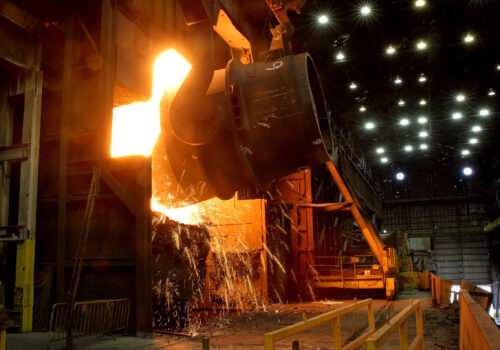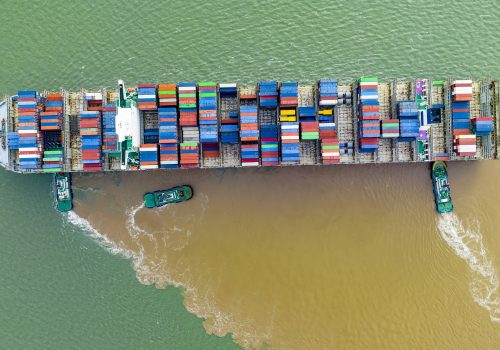Biden blocking Nippon Steel’s purchase of US Steel puts ‘friendshoring’ and more at risk
Multiple sources are reporting that President Joe Biden is preparing to block Nippon Steel’s acquisition of US Steel, using presidential authorities provided through the Committee on Foreign Investment in the United States (CFIUS). If true, this decision would represent a major change in how CFIUS operates and the standards by which it evaluates whether a foreign acquisition should be blocked.
CFIUS is an interagency committee tasked with evaluating national security implications of foreign takeovers of domestic businesses. It has acted with considerable restraint in the almost fifty years since it was created, first through executive order and then codified through legislative action in 1988, 2007, and most recently in 2018. Not including this deal and a 2020 order against TikTok parent company ByteDance that was never enforced*, presidents have only used CFIUS authorities to block seven transactions. The sparing use of CFIUS prohibitions reflects a desire to keep the committee’s activities squarely focused on a narrow set of national security concerns, such as to protect the defense industrial base, to prevent malicious actors from gaining control of critical infrastructure, and to prevent adversaries from accessing advanced technology with military applications.
If the president were to use CFIUS to prevent Nippon’s acquisition of US Steel, this would indicate that either the committee is willing to take a much more expansive view on what constitutes a national security risk or that the committee’s authorities have been repurposed as a cudgel against politically unpopular investment deals.
Perhaps friends will be tolerant of occasional protectionism around especially politically sensitive transactions, but only if such actions are aberrations rather than standard operating procedure.
As I have written previously, there are strong reasons to assess a Nippon acquisition of US Steel would likely strengthen, rather than harm, US national security and economic competitiveness. Nippon Steel has advanced steel production technology that it would transfer to US plants, and it has also indicated that it would invest heavily in expanding the productive capacity of US plants. US tariffs on imported steel would make it exceedingly unlikely that Nippon would have commercial incentives to move production elsewhere. Indeed, employment in the US steel industry would likely increase if this deal were allowed to be completed.
While there may not be strong national security reasons to block this transaction, there are pressing political concerns—particularly during an especially close presidential election season that is likely to be decided in rust belt states, including Pennsylvania, where US Steel is headquartered. At a rally in Pittsburgh earlier this week with Biden, Vice President Kamala Harris said that “US Steel should remain American-owned and American-operated.” The United Steelworkers union has opposed Nippon’s proposed acquisition since it was announced in December 2023, reflecting concerns that a foreign buyer may not be as concerned with honoring US Steel’s commitments to the union. In these circumstances, CFIUS becomes a tempting regulatory tool through which politicians may seek leverage to kill a politically toxic deal. The use of CFIUS in this way is ironic given that a major rationale for creating the review body in the first place was to depoliticize cross-border mergers and acquisitions by placing review authority in the bureaucracy, rather than in the hands of politicians.
Given the exigencies of this election cycle, it is perhaps understandable that the Biden administration is willing to use whatever legal authorities at its disposal to demonstrate its support of a politically powerful constituency. However, there may be serious and long-lasting consequences to turning CFIUS into a politically motivated body rather than a dispassionate, fact-based assessor of security risks. By doing so, the United States risks further eroding its credibility in its outreach efforts to help partners and allies develop investment screening mechanisms that themselves are narrowly tailored to national security—rather than broader protectionist or political—concerns. Indeed, just as the United States may use its screening authority to block a Japanese investment, the Japanese government could use its screening apparatus, which was until recently very lenient, to prohibit a US investment.
More generally, the United States under the Biden administration has rightly reemphasized the importance of building and strengthening alliances to counter concerns generated by China’s economic practices. Restructuring global supply chains for resilience requires working with partners and allies to find feasible alternatives to Chinese suppliers and to coordinate the expansion of economically sustainable productive capabilities. Since US Treasury Secretary Janet Yellen used the term at the Atlantic Council in April 2022, some have labeled this collective approach to reorienting global economic exchange around trusted partner relationships “friendshoring.” But friendshoring only works when the friendly behavior is reciprocated. Perhaps friends will be tolerant of occasional protectionism around especially politically sensitive transactions, but only if such actions are aberrations rather than standard operating procedure. And once a regulatory body is politicized, it can be exceedingly difficult to return to normal, technocratic operations. A word of warning—proceed with extreme caution.
Sarah Bauerle Danzman is a resident senior fellow in the GeoEconomics Center’s Economic Statecraft Initiative.
This article was updated on September 5, 2024 to clarify the number of times presidents have used CFIUS authorities to block transactions.
Further reading
Mon, Jan 8, 2024
The US Steel deal is a test of friendshoring—and the US is failing
New Atlanticist By Sarah Bauerle Danzman
If Washington won’t allow this transaction—involving a buyer from a G7 country—then what foreign buyer would it see as a permissible owner?
Tue, Jul 25, 2023
Is ‘friendshoring’ really working?
New Atlanticist By
The Biden administration has identified around 2,400 critical goods and materials that fall under its efforts to move supply chains out of China. Check out what the data reveal so far.
Thu, Aug 22, 2024
Why the next trade war with China may look very different from the last one
Sinographs By Mrugank Bhusari
Far more countries share concerns over the impact of an expansion of Chinese exports. This time, they will likely target finished consumer goods over intermediary inputs.
Image: US President Joe Biden gives a speech surrounded by United Steelworkers of America officials in Pittsburgh, Pennsylvania, USA on April 17, 2024.(The Yomiuri Shimbun)


